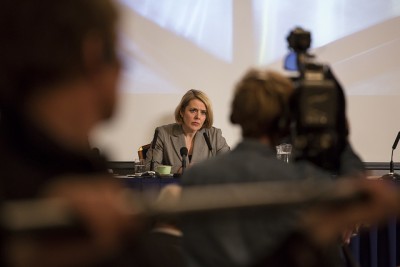The Norwegian Police Security Service (Politiets sikkerhetstjeneste, PST) wants greater access to the online communications of people believed to pose a threat to society. PST has asked the Justice Ministry for permission to use Trojan spyware on targets’ computer keyboards for the first time in Norway, a plan PST admits will face opposition.

Trojan programs are designed to hack a user’s computer, opening a “back door” to give others remote access to the machine, reported Norwegian Broadcasting (NRK). Disguised as a harmless program, Trojans can be used to access files, information, spread viruses or take over a computer completely.
PST boss Benedicte Bjørnland said the software would let PST access a computer’s “data reading,” to see what has been typed on a keyboard even where an email or document has not been sent to someone else. Bjørnland said Islamic extremists, who pose the greatest treat to Norwegian security according to PST, used to be more open in their online activity, but are now going to great lengths to encrypt or hide messages.
“The people who we are most concerned about under our threat assessment are becoming more and more sophisticated,” Bjørnland said. “We see that people who wish to avoid our attention go in and write an email and put it in “drafts.” Then the receiver logs in with the same password and username, and reads the draft email and deletes it. If we’re to catch the type of communication that isn’t sent, we are dependent on data reading.”
Backlash expected
PST will need permission from both the Parliament and the courts to introduce the software. While Bjørnland said it’s necessary to keep up with developing technology and threats to society, she admitted the measure is invasive.
“I believe we’ll get opposition,” she told NRK. “Not everyone will immediately see that this is desirable. They will say there are privacy arguments for why PST should not get to use this method.”
Professor Ann Rudinow Sætnan from the Sociology and Political Science Institute at the Norwegian University of Science and Technology in Trondheim (NTNU) said it would be tough for PST to prove the emails were meant to be shared.
“This is like listening to people’s heads,” she warned. “How will the PST be able to prove that it is a communication, if it hasn’t been sent to anyone? IP addresses can lead to machines and subscriptions, but can’t say who was sitting at the machine and writing.”
Eva Jarbekk, a lawyer and chair of the Privacy Appeals Board (Personvernsnemda) said while failing to adapt to technological advances would be naive, the case throws up some new issues and it’s important to understand exactly what the Police seek to achieve.
Jarbekk said audio recordings are more credible than computer tracking, because voices can be identified while it’s easy to write email in another person’s name or even remotely control their computer. “There will therefore be an uncertain link to who has written an email on a computer,” she told NRK. “PST needs concrete evidence to arrest someone, and the evidence must hold up in court.”
Freedom of expression threatened
“They already have many powers to monitor people, as a preventative measure,” said Jon Wessel-Aas, a lawyer and free speech expert. “In a large number of cases such monitoring will frame people who haven’t done or planned to do anything criminal.” He said court control over an order granting Trojan permission is just “office business” and doesn’t reflect a real terror threat.
He said politicians are increasing PST’s power little by little, last year adopting a law punishing preparation of a hypothetical terror act, even when it’s just in a person’s mind. “PST has a wish list that grows each year,” warned Wessel-Aas. “And each year they get more power to go further and further into private life and freedom of expression.”
Justice Minister Anders Amundsen of the Progress Party (Fremskrittspartiet, FrP) told NRK that PST’s computer monitoring application is being considered. “In the first case it’s only the most serious terror situations which we’re discussing, but it is a part of a methodology which we must look at more thoroughly,” he said. “It is Parliament that will make the final decisions.”
newsinenglish.no/Emily Woodgate

